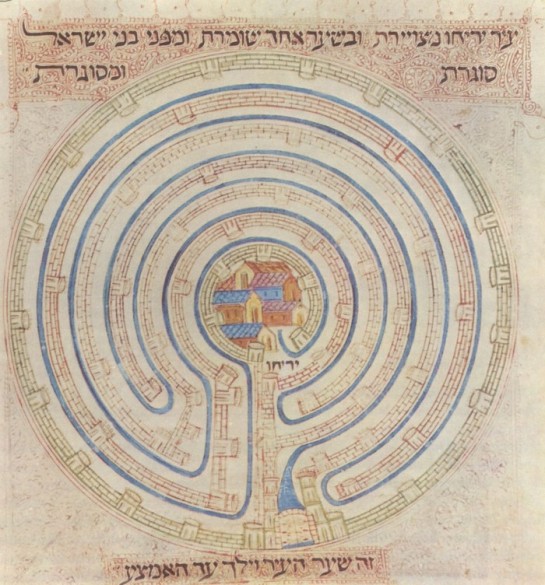The above depiction of Jericho is from the 14th Century Farhi Bible.
In pursuing an undergraduate degree in literature, I learned a few things about storytelling. For instance, and contrary to much of modern storytelling, plot is important. Conflict and conflict resolution, sometimes appearing in cycles throughout a tale draw the observer forward to the ultimate resolution of the primary conflict. Furthermore, character development is a necessary part of manipulating the observer into caring about the outcome of the conflict, forcing the observer to feel they identify with the protagonist or protagonists more than they identify with the bringers of conflict.
What happens in chapter two of the book of Joshua is a mess. Plotwise, events progress too quickly. The spies show up at Rahab’s house, but Jericho PD immediately know where the spies are. Somehow Rahab knew the king would send someone to investigate, so she preemptively hid the spies on the roof. For some reason, the messengers from the king of Jericho don’t bother to search the home of the suspected spy harborer and are easily tricked by Rahab into leaving the premises. All of this takes place in the first seven verses.
Admittedly, conflict exists, but that conflict is shown to be minimal. As mentioned, the spies are hidden and in danger of discovery, but the messengers of the king, having journeyed to Rahab’s house, don’t bother to search where they are, but instead spend multiple days pursuing no one in the reaches outside the city. We see minimal conflict and unbelievable resolution.
Really the only character development that occurs for the spies is the expository information we are given in verse one that the two men are spies of Israel. These spies don’t even receive names. Later, in chapter six, we do see that the spies kept their promise to spare Rahab and her family. We also learn, over the course of events, that Rahab is a prostitute, that she is a traitor to her people, and that she believes the LORD has brought and will bring success to the people of Israel. Nevertheless, while we know some of what these characters did, we never know who they are as people.
In our reading, we easily identify the spies and Rahab as the protagonists of this story because they seem to be the focus of the material. We are wrong. From a literary perspective, the spies are not people at all in this story but are merely a plot device. Rahab may receive more focus than the other characters in this tale, but she is not a protagonist in the traditional sense. As a prostitute, a deceiver, and a traitor to her people, she functions more as an antihero than a protagonist.
If this story is viewed as the tale of the noble Rahab who aided the just Israelites in their holy quest to conquer Jericho, it’s a literary disgrace. However, taken as a later justification for Joshua sparing and marrying Rahab (as stated in the Talmud) or more generally for the inclusion of a Canaanite group among the people of Israel (which was forbidden), this tale makes a little more sense.
For more on Rahab, look here.
For a Jewish take on Rahab, look here instead.

